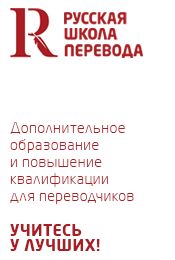Russian-English
Pavel Palazchenko
Originally published in
Russia Beyond the Headlines.
See also: Found in Translation
I've been a translator and interpreter for almost 40 years now, and my fascination with “the untranslatable” has been growing all these years. Mind you, I am speaking of European languages, which are relatively similar. Compared to Piraha, the language of an Amazon tribe that has no concept of numbers or counting, Russian and English have a world in common. One can probably explain almost anything in almost any language but what takes one word to express in English – privacy, for example – might require a whole phrase in other languages, including Russian. Ronald Reagan, famously and wrongly, once said that there is no Russian word for liberty. In fact there is one Russian word – svoboda – for liberty or freedom in English. But wait: we Russians have a difficult-to-render word volya, whose meaning can be described as “freedom to act at will” (it also has another meaning: “the world outside prison walls”). Simple words such as happy or friend are really not the same as their supposed Russian equivalents. Of course happy, and particularly the noun happiness, can sometimes mean the same state of cloud-nine exultation that we invest in the word schastie, but more often than not, happy is just pleased or content. So the Russians are in danger of misunderstanding a simple phrase such as: “Are you happy here?” This is not really about happiness but something like “Do you like it here?” Thus words can be, to use the term coined by the Polish linguist Anna Wierzbicka, culture specific. Let me coin my own term: subculture specific. In “business English” the word aggressive is almost always positive (“We shall aggressively pursue this deal”), while in everyday speech it can be positive or negative, depending on the context. Well, in Russian the meaning of the word agressivny is practically always negative. Of course, when things get really tough languages borrow words from one another. Today, the tendency is to borrow heavily from English, for good reasons (the Anglo-Saxon world is good at technological, economic and cultural innovation) or for bad ones (we are just being lazy or not very creative). From time to time English does borrow from Russian – terrible words like pogrom or Gulag or words we are proud of, like Sputnik, glasnost, or perestroika. I hope that in the future our linguistic exports will be good or at least benign. In the meantime, foreign reporters writing from Russia are racking their brains to describe phenomena such as siloviki or silovye ministerstva. “Power ministries” is wrong and can be misunderstood (“is it about nuclear power?”). And because “law enforcement and security agency officials” is so-o long, they just borrow the word siloviki without explanation. Sapienti sat – a word is enough to the wise.
- Войдите на сайт для отправки комментариев







Последние комментарии
5 лет 34 недели назад
5 лет 44 недели назад
6 лет 22 недели назад
6 лет 41 неделя назад
7 лет 1 неделя назад
8 лет 25 недель назад
8 лет 25 недель назад
8 лет 48 недель назад
8 лет 48 недель назад
9 лет 6 недель назад